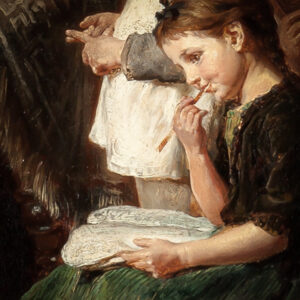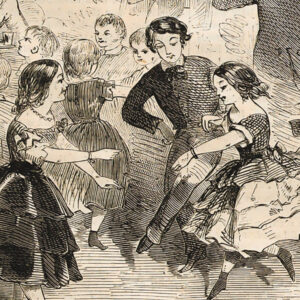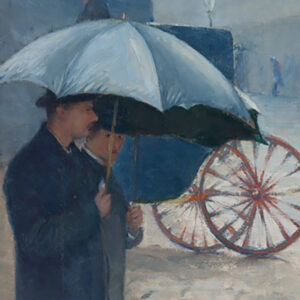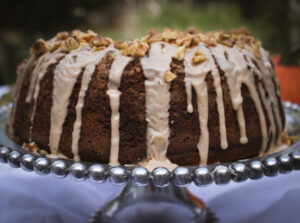—The Inbox—


The Unexpectedly
Called-Upon Host
Response by
Mrs. Carmel Richardson

From a Correspondent:
Dear Hearth & Field,
I very much related to Mrs. Carmel Richardson’s article “The Unexpected Visitor.” I’d love to become brave enough to call on neighbors as my mother and grandmother used to do. And I wish people would feel free to drop in on me in that way. I have never been a very good host, though. I worry about not having anything on hand to offer to eat or drink, but I may just as easily forget to offer anything.
Could you share some thoughts about being a good host, maybe even addressing the nitty-gritty of how to stock a pantry to accommodate drop-in visitors? Any tips would be appreciated!
Kind regards,
Beth
Dear Beth,
There’s a peculiar thing that happens when you’re raised by Yankees in the South. The importance of hospitality is impressed on you from a young age by parents who, God bless them, aren’t entirely sure what that should look like in the particulars of the local context. I still remember my mother, for whom I have nothing but respect, sending me with a candle as a hostess gift for my high school friend’s mother, a born-and-bred Southerner, when we girls were getting together on an ordinary weekday. Momma knew that, as a general principle, it was polite to send something to your hostess, but what she had confused, to the amusement of my friend and her mother, was the context — for example, that hostess gifts are for parties, extended stays, and more formal occasions and not when two high school girls hang out.
My mother is so friendly and endearingly self-deprecating that she can get away with such mishaps where the rest of us might not. Hospitality, belonging as it does to the class of manners, has peculiarities that are unique to where you live, and the best way to become a better host is, ultimately, to watch your more experienced neighbors and mimic what they do that seems to be working. Inevitably, you won’t know someone is gluten free until you try to serve him bread, but that’s just life, and people are mostly forgiving. While you learn the particulars of your locality, however, here are a few general ideas that I have found to be helpful.
Like conversation, canapes should be light. A good rule of thumb is to serve refreshments that can be eaten easily and are not too filling. You don’t need a large volume of food, but you do need enough to nibble on. Try to offer two things — if your guest doesn’t want one, odds are he wants the other, and you won’t both be uncomfortable after he has refused all you had to share. That can mean two foods, or a food and a drink, or two foods and a drink, but one should always be edible.
For your first piece, cookies are an excellent choice. You can freeze cookie dough in pre-shaped balls and just put a couple in the oven whenever a friend shows up. Since our family gave up sugar for Lent, I’ve lately been making soft pretzels as an alternative to sweets that require minimal preparation (if, like me, you struggle to form the classic twist, just roll them into small pretzel bites or knots). If you’re inclined to bake other things throughout the week — biscuits, cakes, scones, et cetera — by all means do not hold back. But don’t overthink it either. Many a good conversation has been had over store bought rice cakes and a jar of peanut butter in our house.
Fruit is always a safe companion, because almost no one is allergic to it. Grapes, sliced apples, and clementines are easiest; berries typically mold too quickly and are too expensive to keep on hand. Cheese, nuts, and dried fruit are other easy options to pair, either with a sweet bread or with one another.
Two other essentials I try to always keep “on stock,” beyond the obvious essentials of tea and coffee, are sparkling water and shortbread. Shortbread keeps for ages, so it’s always there when you need it. Sparkling water is great if you have friends with children or friends who don’t do caffeine — you can still offer them something more exciting than water. (But do also give plain water to every guest as a matter of course.)
For a drink more exciting still, especially if it’s a hot afternoon or a cold evening, you may wish to offer your guest a cocktail. This can be arranged easily enough if you keep onhand a bottle each of whiskey, gin, rum, vodka, and bitters, all of which, when stored properly, will stay fresh for years. Keep some sour mix, or better, a jar of simple syrup, tonic water, and a handful of limes and lemons, and you’ve got a world of possible concoctions. If you lack confidence in your cocktail mixing abilities, have a practice run and teach yourself two or three of the easiest—my favorite is a gin and tonic, and it’s almost impossible to mess up.
Above all else, remember that hosting is about proffering comfort, not performing. It’s just unrealistic to expect you’ll be pulling hot cookies out of the oven every time a guest arrives, and there’s no reason why he should expect you to be either. Instead, put him at ease by giving him an easy task to manage — making coffee, boiling water for tea, setting plates and forks at the table — while you bustle about the kitchen. People like to feel like they have a purpose, and there’s something about having things to do with our hands that makes conversation come more easily.
All the best in your hosting endeavors,
—Carmel




















